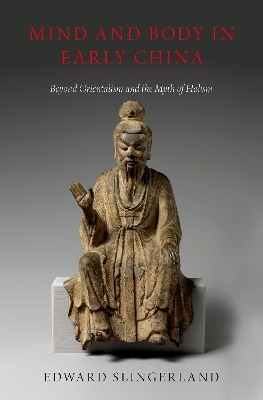
Mind and Body in Early China
Oxford University Press Inc (Verlag)
978-0-19-084230-7 (ISBN)
Edward Slingerland argues that the humanities need to move beyond social constructivist views of culture, and embrace instead a view of human cognition and culture that integrates the sciences and the humanities. Our interpretation of texts and artifacts from the past and from other cultures should be constrained by what we know about the species-specific, embodied commonalities shared by all humans. This book also attempts to broaden the scope of humanistic methodologies by employing team-based qualitative coding and computer-aided "distant reading" of texts, while also drawing upon our current best understanding of human cognition to transform our basic starting point. It has implications for anyone interested in comparative religion, early China, cultural studies, digital humanities, or science-humanities integration.
Edward Slingerland is Distinguished University Scholar and Professor of Asian Studies at the University of British Columbia. His research specialties and teaching interests include early Chinese thought, religious studies, cognitive linguistics, ethics, and the relationship between the humanities and the natural sciences.
Introduction
Chapter One: The Myth of Holism in Early China
PART I: Qualitative Approaches to Concepts of Mind and Body
Chapter Two: Soul and Body: Traditional Archeological and Textual Evidence for Soul-Body Dualism
Chapter Three: Mind-Body Dualism in the Textual Record
PART II: Quantitative Approaches to Concepts of Mind and Body
Chapter Four: Embracing the Digital Humanities: New Methods for Analyzing Texts and Sharing Scholarly Knowledge
PART III: Methodological Issues in the Interpretation of Textual Corpora
Chapter Five: Hermeneutical Constraints: Minds in Our Bodies and Our Feet on the Ground
Chapter Six: Hermeneutical Excesses: Interpretive Missteps and the Essentialist Trap
Conclusion: Naturalistic Hermeneutics and the End of Orientalism
Bibliography
Index
| Erscheinungsdatum | 27.12.2018 |
|---|---|
| Zusatzinfo | 19 |
| Verlagsort | New York |
| Sprache | englisch |
| Maße | 236 x 163 mm |
| Gewicht | 658 g |
| Themenwelt | Geisteswissenschaften ► Philosophie ► Geschichte der Philosophie |
| Geisteswissenschaften ► Philosophie ► Philosophie der Neuzeit | |
| Geisteswissenschaften ► Religion / Theologie ► Weitere Religionen | |
| ISBN-10 | 0-19-084230-X / 019084230X |
| ISBN-13 | 978-0-19-084230-7 / 9780190842307 |
| Zustand | Neuware |
| Haben Sie eine Frage zum Produkt? |
aus dem Bereich


